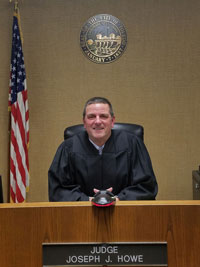About the Toledo Municipal Court
VISION STATEMENT
- Lead the way in developing innovative and effective solutions for housing court litigants
- Link homeowners, tenants and landlords to community resources to maintain safe homes for our citizens
- Foster partnerships with community organizations and governmental entities for continued improvement of available housing
WHAT IS THE TOLEDO MUNICIPAL HOUSING AND ENVIRONMENTAL COURT?
The Environmental Housing Court was established in 1987, allowing the Toledo Municipal Court to consolidate all criminal and civil housing and environmental cases into a single session of Court, to be presided over by a Judge specifically elected to that position.
On December 21, 2017, Judge Joseph J. Howe was sworn in as Judge for the Housing and Environmental Court to fill the vacancy created by the December 31, 2017 retirement of Judge C. Allen McConnell.
The Environmental Court has both a civil docket and a criminal docket.
Criminal Cases
Housing Court deals with issues surrounding properties that directly impact the quality of life in Toledo’s neighborhoods. The Court’s goal is to achieve compliance with code ordinances, resulting in improving the beautification and safety of Toledo’s housing stock and businesses. The criminal docket of the Environmental Court hears cases involving alleged violations of the Toledo Municipal Code Chapters 11, 13, 15 and 17 (Planning and Zoning, Building, Fire Prevention and Health Codes).
Defendants appear before the Court after charges have been brought by the City Health, Fire, Neighborhoods and Inspection Departments seeking to enforce zoning, building, health, safety and nuisance abatement codes. House stripping, fire prevention, dumping, littering, (and cases referred from the civil docket) are also included in the criminal docket.
While some of the criminal defendants that come before this Court are willful violators of housing code ordinances, many of the defendants are hard-working people who have become overwhelmed by the demands of home maintenance due to financial and/or physical limitations. Many of these defendants are elderly and indigent.
A defendant is expected to enter a plea at the arraignment stage of the proceeding. If the condition can be corrected in a short time, or the Inspector approves, sentencing may be reserved and the case continued for a reasonable period of time to allow the defendant to do what is necessary to comply with the Code.
While little tolerance is given for repeat offenders and negligent investment property owners, the Court’s goal of compliance is reached by most defendants through assistance rather than retribution.
Civil Cases
The civil docket includes matters that also impact the housing stock and quality of life in Toledo’s neighborhoods. Cases involving landlord-tenant disputes known as Forcible Entry and Detainer actions (FED’s) and rent escrows under Chapters 1923 and 5321 of the Ohio Revised Code, and civil actions filed by the City of Toledo for a temporary restraining order to abate a nuisance, receivership appointments to abate a nuisance and any motions for stays of eviction or temporary restraining orders.
A Housing Court Magistrate hears all first causes of action in FED’s (evictions), as well as rent escrow cases wherein tenants deposit rent into an escrow account with the Court because of a dispute with the landlord. The Magistrate’s orders are submitted to the Housing Court Judge for approval. Any objections to the orders of the magistrate are referred to the Housing Court Judge for decision or hearing. Beginning in September 1993, in an attempt to expedite cases, the rent escrows are first referred to the Court’s Citizen Dispute Settlement Program (CDSP) for possible resolution prior to a formal hearing.
Whenever an allegation of substandard or unfit conditions is raised at a rent escrow or FED hearing, an immediate referral is made to a Housing Specialist. In eviction hearings, a Housing Specialist may be appointed to investigate those specific conditions and other conditions constituting code violations. The property owner is ordered not to re-rent the unit until these conditions are corrected. The property owner is assisted in establishing timeframes for completion. Oftentimes, the Housing Specialist acts as a mediator between the property owner and the tenant to achieve a compromise for the particular problem.


